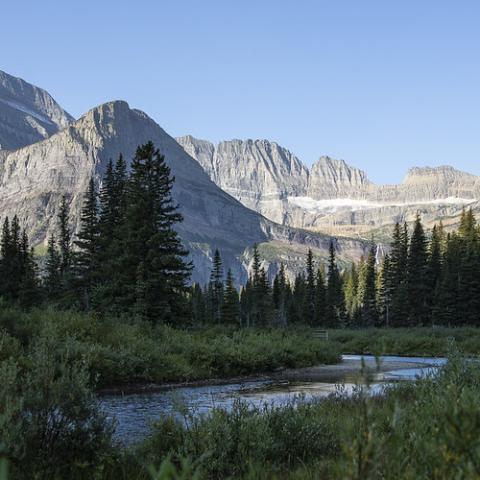
Citizen scientists will help Glacier National Park staff collect information on Common loons in the park this summer/NPS file
Glacier National Park officials are inviting the general public this summer to help the park track and study important species of concern through its citizen science program. The program allows participants to explore the park and learn about important park resources while collecting valuable data for park managers.
One citizen scientist in the past said the experience was an “excuse to go into the park, sit down for an hour and just search with scope and binoculars—the greatest and most effective and cost-efficient therapy out there!”
Participants can help out with several projects on an ongoing basis, or attend a one-time citizen science event.
Citizen Science Projects
People who would like to collect data on a variety of species of concern and can commit to completing a minimum of three surveys should sign-up for a one-day training session to learn how to identify, observe, and record species information.
Once trained, citizen scientists are free to collect data during their own scheduled hiking trips in the park. You can contact the Crown of the Continent Research Learning Center at [email protected] or by calling 406-888-7986 to sign-up for training or for more information.
Scheduled training dates for all ongoing citizen science projects are listed below. Additional training sessions may be scheduled based on interest.
Common Loon Citizen Science
Gather information on the distribution and reproduction of common loons to understand more about population trends and nesting success.
West Glacier training dates: May 7, May 14, June 27, July 9
St. Mary training date: May 29
High Country Citizen Science
Document mountain goats and pikas at selected sites to assist with population and distribution estimates and genetic mapping. These species are habitat and temperature sensitive, and may be affected by changing climate.
West Glacier training dates: June 4, June 15, July 16, July 29
St. Mary training date: June 26
Huckleberry Phenology Citizen Science
Huckleberries are an important food source for wildlife, including grizzly bears. The park is collecting data to understand how weather and other factors influence the phenology, or timing, of berry ripeness.
West Glacier training date: June 6
Lynx Camera Trapping
Canada lynx are a rare and elusive predator native to Glacier National Park. The goal of this project is to learn the status of lynx populations in the park using camera traps to determine where they are currently present. Citizen scientists can help this research project by hiking to camera traps along trails to check and take down cameras. This is a new project, made possible by donor funding from the Glacier National Park Conservancy.
West Glacier training date: August 1 (evening)
Hawk Watch Raptor Migration Counts
One of the most important migration routes for golden eagles and other raptors on their way from northern breeding grounds to warmer climates passes through the Continental Divide in Glacier National Park. Citizen scientists count migrating raptors at Mount Brown or Lake McDonald Lodge.
West Glacier training date: August 27
Citizen Science Special Events
Noxious Weed Blitz on July 18
Participants learn about the ecological impacts and identification of noxious weeds and assist in hand pulling.
July Wildlife Crossings Map-a-Thon
The park will hold a map-a-thon this summer to document wildlife crossings along US Highway 2. Multiple workshops will be held in July in West Glacier and East Glacier. Participant observations will help prioritize locations for wildlife crossing structures or other mitigation efforts to help keep wildlife migrating throughout the Crown of the Continent.
Alpine Bird Bioblitz on July 19
Participants will document and learn about 12 of Glacier’s alpine bird species.
Fall Fungus Bioblitz on October 12-13
Participants team up with mycologists to identify as many species of fungus as they can find.
Citizen Science Program Information
Since 2005, the Crown of the Continent Research Learning Center in Glacier National Park has managed the Glacier Citizen Science Program. It relies on trained citizen scientists to collect population data on species of interest to the park. Citizen science training informs participants about threats to native plants and animals that may result from human disturbance, climate change, and invasive species. The citizen science program not only provides valuable data to park managers, but also creates an informed group of people involved in active Glacier National Park stewardship.
Glacier National Park Conservancy donors provide nearly all funding for the park’s citizen science program.




 Support Essential Coverage of Essential Places
Support Essential Coverage of Essential Places







Add comment